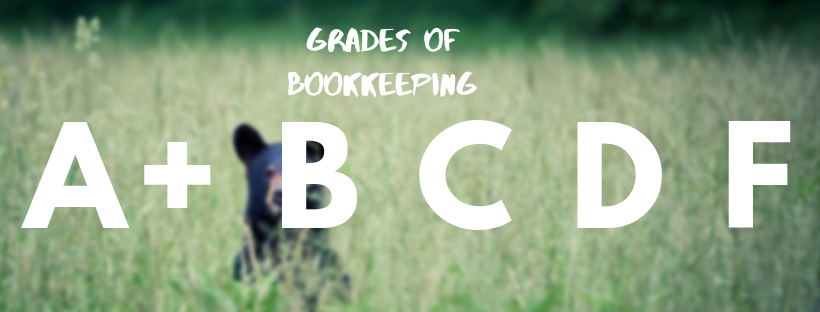|
Who doesn't like unsolicited testimonials from clients? Jake from leadcookie.com sent me this the other day and gave me permission to share.
"Working with Avery is amazing. It's like having an accounting coach who actually helps you understand your numbers instead of some accountant who speaks a different language. I can honestly say that since starting to work with him, I have a better understanding of my finances, of Xero, and the numbers driving my business. Previous accountants were just a pain in my butt who were there to keep the books clean... Avery is an asset who helps me understand my books and improve my business as a result" I had a former job as a professor at a technical college teaching statistics, so I can sympathize with customers being frustated about numbers and rules that don't make sense. I like it when client's can leave understanding why I did the work I did in addition to having it complete.
0 Comments
When I talk with clients, especially about bookkeeping, I try to explain that there are vary grades of bookkeeping, from an F to an A+. They are all 'bookkeeping' but in varying levels of quality. I'm going to explain them with this article:
A+ bookkeeping can also be called "Audit Ready". Audit ready, in my case, means ready to respond to an IRS examination. For each item on the books, there needs to be a connection to a bank statement AND a receipt. Having this all in one place and reconciled to the bank and credit card statements will blow any auditor's socks off as well as providing good data for business insights. B bookkeeping would be 'almost audit ready' and is usually missing one of the parts of A+ bookkeeping. For example: the books are all reconciled to bank statement lines, and receipts exist somewhere but aren't organized. This standard of bookkeeping will provide good data for business analysis but will make an audit difficult. C bookkeeping is "good enough" and is the minimum to produce anything useful for business analysis. This standard is reconciling or categorizing bank and credit card data without backup documents or receipts. This method is OK for internal use but will get you beat up pretty badly in a tax audit. D bookkeeping is an attempt at C level bookkeeping but with bank statement information that is incorrect. It does not match the bank and is missing or containing duplicate information. This level of information can be misleading for business information and is not great for audit purposes. F bookkeeping is either fabricated, fraudulent or non-existent. No one uses it for business information, it will fail you in an audit and maybe also get you some jail time if you are using fabricated books in an audit. Note: Fabricated and reconstructed are not the same words and are a topic for another article. I provide A+ bookkeeping when hired by clients. If a client would like to use a lower standard that is fine, it is their business and their budget. For grades B through D I am happy to work on a consulting or training basis where the client is the lead on the books. For client's with grade F books, I can work to do repairs to get them to at least a D. Welcome to Smoky Mountain Tax Consulting! Why and how services are changing from Paul Bunyan Tax are going to be explained in this article. The short version is that fixed rate services are changing to hourly, with increasing quality and options. The details follow below: Hourly vs. Fixed rates: When I started my business, everywhere I read advocated for fixed, or value pricing as the 'new way' and so I bought into it. After 7 years, I've come to the conclusion that it is not the way to go. The profit motive of fixed or quoted services is wrong. That motive is the highest profit is to be made by spending the minimum amount of time on each client. For hourly clients, the motive is to do the job right. My hourly clients are the happiest with the jobs I've done for them, and my conflicts come from the fixed rate ones. Part of that reason is because hourly services are infinitely customizable. You get exactly what you ask for and are never told "no, that's not included in your package offering". Hourly clients also get rewarded for being good clients. Clients that send me well organized files and notate their transactions save time on the work that they request. Only the provider gets that benefit under a fixed rate service. Xero vs. Quickbooks: Xero was a huge part of Paul Bunyan Tax Services when It first started. It was the best online bookkeeping software and had a great partner program that produced a lot of leads. Fast forward almost 10 years, the partner program is ineffective, the software has strange updates and Quickbooks has put a ton of investment into their product. There isn't a need to align with Xero anymore, so Smoky Mountain Tax is software independent. Both Xero and Quickbooks are great, Xero just isn't my preference 100% of the time. Scale: Over the years, I had hired staff occasionally to work with Paul Bunyan Tax, and it never really worked out. Smoky Mountain Tax Consulting isn't going to be a "We" business, it will be an "I" business. I will work directly with each client, the business will stay very personal because that is what Clients enjoy, and what differentiates me from other firms. Location: My family and I live in one of the most beautiful places in the United States, its an advantage over tax practices in larger, but less exciting places like Chicago or Indianapolis. Changing the name and branding of the firm, I hope will give clients the opportunity to consider traveling to the area to get their taxes or other consulting work done in an environment like no other. I'm looking forward to turning what has been an A+ service into an A++ service for my clients.
|



 RSS Feed
RSS Feed